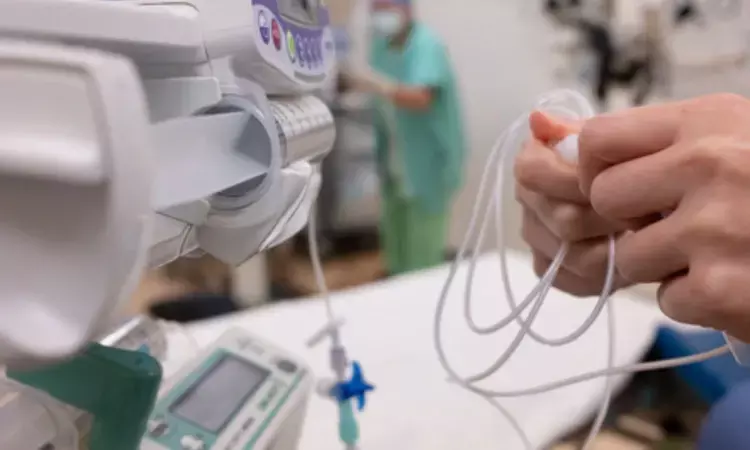- Home
- Medical news & Guidelines
- Anesthesiology
- Cardiology and CTVS
- Critical Care
- Dentistry
- Dermatology
- Diabetes and Endocrinology
- ENT
- Gastroenterology
- Medicine
- Nephrology
- Neurology
- Obstretics-Gynaecology
- Oncology
- Ophthalmology
- Orthopaedics
- Pediatrics-Neonatology
- Psychiatry
- Pulmonology
- Radiology
- Surgery
- Urology
- Laboratory Medicine
- Diet
- Nursing
- Paramedical
- Physiotherapy
- Health news
- Fact Check
- Bone Health Fact Check
- Brain Health Fact Check
- Cancer Related Fact Check
- Child Care Fact Check
- Dental and oral health fact check
- Diabetes and metabolic health fact check
- Diet and Nutrition Fact Check
- Eye and ENT Care Fact Check
- Fitness fact check
- Gut health fact check
- Heart health fact check
- Kidney health fact check
- Medical education fact check
- Men's health fact check
- Respiratory fact check
- Skin and hair care fact check
- Vaccine and Immunization fact check
- Women's health fact check
- AYUSH
- State News
- Andaman and Nicobar Islands
- Andhra Pradesh
- Arunachal Pradesh
- Assam
- Bihar
- Chandigarh
- Chattisgarh
- Dadra and Nagar Haveli
- Daman and Diu
- Delhi
- Goa
- Gujarat
- Haryana
- Himachal Pradesh
- Jammu & Kashmir
- Jharkhand
- Karnataka
- Kerala
- Ladakh
- Lakshadweep
- Madhya Pradesh
- Maharashtra
- Manipur
- Meghalaya
- Mizoram
- Nagaland
- Odisha
- Puducherry
- Punjab
- Rajasthan
- Sikkim
- Tamil Nadu
- Telangana
- Tripura
- Uttar Pradesh
- Uttrakhand
- West Bengal
- Medical Education
- Industry
Peripheral IV Access Effective for Testicular Cancer Chemotherapy

A recent study published in the JCO Oncology Practice highlighted a more patient-friendly approach for administering chemotherapy in individuals with testicular cancer (TC). The study spanned from 2005 to 2020 and focused on the systemic chemotherapy delivery through peripheral intravenous (pIV) access and central venous access devices (CVADs).
The retrospective analysis was conducted at the University of Colorado Hospitals and included a total of 154 TC patients who underwent first-line chemotherapy. 60% of patients opted for CVADs, while 40% of the patients chose pIV for their initial treatment. Also, only 9.7% of the patients who were initially using pIV transitioned to CVADs during therapy which indicated the successful tolerance of peripheral IV access. 10.9% of patients with initial CVAD use needed to switch to either a different CVAD or pIV by emphasizing comparable adaptability between the two methods.
The findings of the study centered around the complication rates and risk factors. The patients relying on CVADs experienced a higher number of venous access-related complications (52.2%) and overall thrombotic events (35.9%) when compared to the pIV group. This significant contrast (P > .001) underlines the potential advantages of opting for peripheral IV access in delivering first-line nonvesicant chemotherapy for TC patients.
The study identified several factors that were linked with venous access-related complications during chemotherapy, including higher stage TC, increased total chemotherapy cycles and delayed therapy. The outcomes support a trend in the preferred method of the chemotherapy administration for TC patients in advocating for the use of peripheral IV access. With high rates of therapy completion and lower complication rates, this approach emerged to be a safe and effective alternative to traditional CVADs.
Reference:
Wiesen, B., Atwell, M., Leavitt, C., Clark, N., Kessler, E., Lam, E., Flaig, T., Kukreja, J., Kim, S., Maroni, P., & Cost, N. G. (2023). Use of Peripheral Intravenous Access in Patients Undergoing Chemotherapy for Testicular Cancer. In JCO Oncology Practice. American Society of Clinical Oncology (ASCO). https://doi.org/10.1200/op.23.00580
Neuroscience Masters graduate
Jacinthlyn Sylvia, a Neuroscience Master's graduate from Chennai has worked extensively in deciphering the neurobiology of cognition and motor control in aging. She also has spread-out exposure to Neurosurgery from her Bachelor’s. She is currently involved in active Neuro-Oncology research. She is an upcoming neuroscientist with a fiery passion for writing. Her news cover at Medical Dialogues feature recent discoveries and updates from the healthcare and biomedical research fields. She can be reached at editorial@medicaldialogues.in
Dr Kamal Kant Kohli-MBBS, DTCD- a chest specialist with more than 30 years of practice and a flair for writing clinical articles, Dr Kamal Kant Kohli joined Medical Dialogues as a Chief Editor of Medical News. Besides writing articles, as an editor, he proofreads and verifies all the medical content published on Medical Dialogues including those coming from journals, studies,medical conferences,guidelines etc. Email: drkohli@medicaldialogues.in. Contact no. 011-43720751


